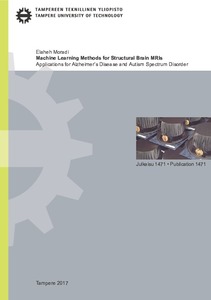Machine Learning Methods for Structural Brain MRIs: Applications for Alzheimer’s Disease and Autism Spectrum Disorder
Moradi, Elaheh (2017)
Moradi, Elaheh
Tampere University of Technology
2017
Teknis-taloudellinen tiedekunta - Faculty of Business and Technology Management
This publication is copyrighted. You may download, display and print it for Your own personal use. Commercial use is prohibited.
Julkaisun pysyvä osoite on
https://urn.fi/URN:ISBN:978-952-15-3945-9
https://urn.fi/URN:ISBN:978-952-15-3945-9
Tiivistelmä
This thesis deals with the development of novel machine learning applications to automatically detect brain disorders based on magnetic resonance imaging (MRI) data, with a particular focus on Alzheimer’s disease and the autism spectrum disorder. Machine learning approaches are used extensively in neuroimaging studies of brain disorders to investigate abnormalities in various brain regions. However, there are many technical challenges in the analysis of neuroimaging data, for example, high dimensionality, the limited amount of data, and high variance in that data due to many confounding factors. These limitations make the development of appropriate computational approaches more challenging. To deal with these existing challenges, we target multiple machine learning approaches, including supervised and semi-supervised learning, domain adaptation, and dimensionality reduction methods.
In the current study, we aim to construct effective biomarkers with sufficient sensitivity and specificity that can help physicians better understand the diseases and make improved diagnoses or treatment choices. The main contributions are 1) development of a novel biomarker for predicting Alzheimer’s disease in mild cognitive impairment patients by integrating structural MRI data and neuropsychological test results and 2) the development of a new computational approach for predicting disease severity in autistic patients in agglomerative data by automatically combining structural information obtained from different brain regions.
In addition, we investigate various data-driven feature selection and classification methods for whole brain, voxel-based classification analysis of structural MRI and the use of semi-supervised learning approaches to predict Alzheimer’s disease. We also analyze the relationship between disease-related structural changes and cognitive states of patients with Alzheimer’s disease.
The positive results of this effort provide insights into how to construct better biomarkers based on multisource data analysis of patient and healthy cohorts that may enable early diagnosis of brain disorders, detection of brain abnormalities and understanding effective processing in patient and healthy groups. Further, the methodologies and basic principles presented in this thesis are not only suited to the studied cases, but also are applicable to other similar problems.
In the current study, we aim to construct effective biomarkers with sufficient sensitivity and specificity that can help physicians better understand the diseases and make improved diagnoses or treatment choices. The main contributions are 1) development of a novel biomarker for predicting Alzheimer’s disease in mild cognitive impairment patients by integrating structural MRI data and neuropsychological test results and 2) the development of a new computational approach for predicting disease severity in autistic patients in agglomerative data by automatically combining structural information obtained from different brain regions.
In addition, we investigate various data-driven feature selection and classification methods for whole brain, voxel-based classification analysis of structural MRI and the use of semi-supervised learning approaches to predict Alzheimer’s disease. We also analyze the relationship between disease-related structural changes and cognitive states of patients with Alzheimer’s disease.
The positive results of this effort provide insights into how to construct better biomarkers based on multisource data analysis of patient and healthy cohorts that may enable early diagnosis of brain disorders, detection of brain abnormalities and understanding effective processing in patient and healthy groups. Further, the methodologies and basic principles presented in this thesis are not only suited to the studied cases, but also are applicable to other similar problems.
Kokoelmat
- Väitöskirjat [4772]
